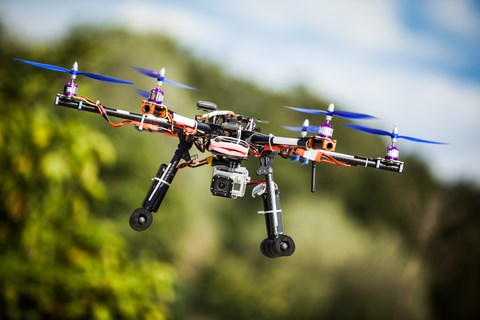Smugglers are taking to the air and using drones to get past walls and fences to deliver drugs, cellphones and other contraband to inmates at correctional centres.
That is why B.C. Corrections is gathering information about ways it can use technology to protect its 10 provincial institutions from drones.
While drones are not yet "a significant concern," as they are in other jurisdictions, the agency says it is always looking for ways to respond to potential new threats.
"To this end, B.C. Corrections is currently consulting with security advisors on drone detection options," the service said in an email.
B.C. Corrections would not provide data about drone-related incidents at its facilities "due to security."
In a request for information that closed on Monday, Corrections B.C. noted that the drone industry has grown over the years, and there is potential for the devices to be used for surveillance and smuggling contraband.
For that reason, it is interested in technology that can detect drones in use, within and around one kilometre from its jails.
The agency is looking to find out the level of market interest, get information about new technologies and approaches to drone detection, and get cost estimates. The type of detection equipment it hopes to use has not been determined, however some common ways to detect drones include cameras and sensors that detect the sound of a drone or pick up its radio frequency.
B.C. Corrections is not the first agency to look at drone detection, which is common in the U.S., where contraband smuggling by drones is a bigger problem.
The Correctional Service of Canada, which oversees 43 federal institutions across the country, including nine in B.C., will spend $6-million over the next three years on a pilot of its drone detection program at six institutions.
"Several incidents within the last few years have revealed that there is an emerging potential vector for introducing contraband to an institution created by small commercially available drones," said CSC spokesperson Véronique Vallée.
Vallée said they do not keep data specific to drone deliveries.
The service issued a request for proposals for the detection system, which closed on July 31. It's expected that about $1 million will be spent this year on the project.
The project will take place at Mission, Collins Bay (Ontario), Cowansville (Quebec), Donnacona (Quebec), Dorchester (New Brunswick), and Stony Mountain (Manitoba) institutions over the next four years.
Vallée said that the institutions were selected based primarily on the number of reported drone signings, as well as making sure each region had at least one test site.
It's expected that the first system will be installed by March 31, 2020, with the rest completed by March 31, 2022. The service has not determined in which order the institutions will receive their detection systems.
The pilot ends in March 2023, at which time a report will be prepared providing recommendations on next steps.
"CSC regularly reviews the use of innovative security tools to enhance its capacity to limit security incidents and prevent security breaches," Vallée said.
Restricted airspace covers federal prisons and there are no-fly zones over provincial detention centres, which also have signs on their perimeter fences telling the public that drones are forbidden in the area.
Transport Canada spokesperson Annie Joannette said that under the Aeronautics Act, anyone who violates controlled or restricted airspace with any size drone used for any purpose could be subject to fines of up to $25,000 and/or prison time. Drone operators are also subject to the Criminal Code and all provincial, territorial and municipal laws about privacy and trespassing.
"Using a drone in a reckless and negligent manner could cause property damage or bodily harm, resulting in lawsuits, fines, and jail time," said Joannette.



